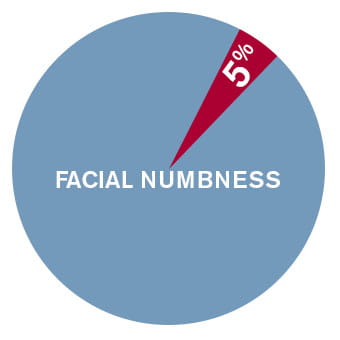ACOUSTIC NEUROMA

An Acoustic Neuroma, also known as a Vestibular Schwannoma, is a benign tumor involving a small nerve joining the inner ear to the brain stem (8th cranial nerve). The tumors are thought to be a result of a malfunctioning gene on chromosome 22 and are also associated with a rare genetic disorder known as Neurofibromatosis Type 2.

Symptoms
Initial symptoms commonly include:
- Hearing loss
- Ringing in the ears
- Impaired balance
Some individuals will develop facial numbness; however, only around 5% of patients will present with facial weakness.
Technique
Acoustic neuromas are managed in one of three ways. If the tumor is small and slow growing your otolaryngologist may recommend observation with serial imaging studies. Although many of these tumors will not enlarge over time progressive hearing loss is common. Alternately, Stereotactic Radiation therapy may be recommended. Gamma Knife, Cyber Knife, LINAC and other forms of radiation therapy can be utilized to precisely target the tumor while limiting collateral damage.
Radiation therapy is frequently reserved for tumors less than 2.5 cm in diameter and is often avoided in the presence of brain stem compression, impaired circulation of cerebral fluid (hydrocephalus), and fifth cranial nerve compression. When utilized it will arrest the growth of the tumor in the great majority of cases; however, hearing loss and other symptoms may progress.
Recovery
Post radiation facial weakness was common with the initial use of this technology; however, lower radiation doses and refined protocols have limited this side effect to around 1%. Alternately, your otolaryngologist may recommend surgical resection of the tumor utilizing microsurgical technique.
Surgical specialists in high volume centers employing intraoperative facial nerve monitoring have become very adept at preserving facial nerve function during acoustic neuroma resection although hearing must often be sacrificed. Despite these advanced surgical techniques transient and or permanent facial weakness is not uncommon when removing large tumors (>3 cm) especially in the elderly patient. In these rare situations a series of facial reanimation treatment options are available to help restore symmetry and motion.
Acoustic neuromas are managed in one of three ways. If the tumor is small and slow growing your otolaryngologist may recommend observation with serial imaging studies. Although many of these tumors will not enlarge over time progressive hearing loss is common. Alternately, Stereotactic Radiation therapy may be recommended. Gamma Knife, Cyber Knife, LINAC and other forms of radiation therapy can be utilized to precisely target the tumor while limiting collateral damage.
Radiation therapy is frequently reserved for tumors less than 2.5 cm in diameter and is often avoided in the presence of brain stem compression, impaired circulation of cerebral fluid (hydrocephalus), and fifth cranial nerve compression. When utilized it will arrest the growth of the tumor in the great majority of cases; however, hearing loss and other symptoms may progress.
Recovery
Post radiation facial weakness was common with the initial use of this technology; however, lower radiation doses and refined protocols have limited this side effect to around 1%. Alternately, your otolaryngologist may recommend surgical resection of the tumor utilizing microsurgical technique.
Surgical specialists in high volume centers employing intraoperative facial nerve monitoring have become very adept at preserving facial nerve function during acoustic neuroma resection although hearing must often be sacrificed. Despite these advanced surgical techniques transient and or permanent facial weakness is not uncommon when removing large tumors (>3 cm) especially in the elderly patient. In these rare situations a series of facial reanimation treatment options are available to help restore symmetry and motion.
real patient case studies
Learn how facial paralysis surgery and functional restoration can help you.
